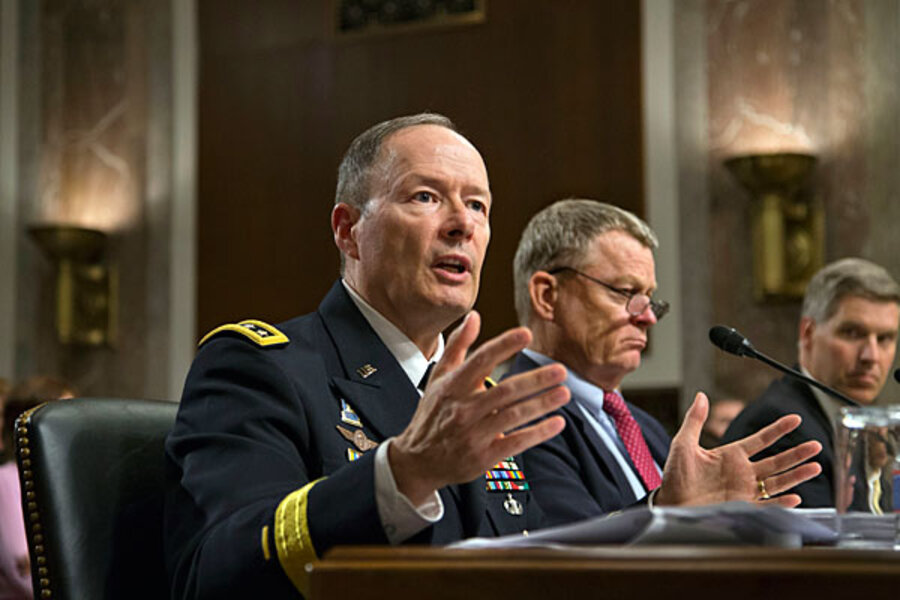NSA surveillance foiled 'dozens' of terror plots, agency chief says
Loading...
| Washington
The US government’s top-secret phone call-monitoring programs revealed in leaks to the media have helped to foil “dozens” of terrorist attacks on US soil, according to the head of the National Security Agency (NSA).
On Capitol Hill Wednesday for a previously scheduled hearing to discuss cyberoperations, Gen. Keith Alexander, the head of the NSA, argued to lawmakers that the secret surveillance program has been “critical” to national security.
That said, the clandestine agency is also endeavoring to be “transparent” with the American people, General Alexander assured lawmakers.
One closely-watched exchange came when Sen. Patrick Leahy (D) of Vermont challenged Alexander about the provisions of the Patriot Act, as well as the Foreign Intelligence Surveillance Act (FISA), which have allowed the NSA to collect information including phone and e-mail records of Americans.
“We’ve had a number of comments and proposals in the judiciary committee to improve these provisions, but the intelligence community has told us that really we obviously don’t have the ability as simple senators to know anything as well as you do, and so they do not need changes,” a skeptical Senator Leahy said. “I’m told they are critical to our counterterrorism efforts – Congress shouldn’t tinker with them at all.”
Leahy added, however, that now he wasn’t so sure that the “trust” lawmakers has placed in the NSA to date has been particularly “wise.”
Instead, he proposed, “We should actually debate [the provisions] in a free and open society.”
The hearing made it clear that the Obama administration is eager to make the case that the program is “critical” to national security – and to appear transparent.
Alexander noted that he is trying to get permission to release at least some examples of the ways in which the phone surveillance program revealed by The Guardian last week is helping to thwart terrorist attacks.
“I want the American people to know that we’re being transparent here,” Alexander said. “It’s dozens of terrorist events that these have helped prevent.”
The NSA head cited a case involving the plot to bomb the New York City subway system, in particular, which he said was disrupted by the provision which allows the NSA to monitor telephone communications.
“In fact, not just critical,” Alexander said of the provision. “It was the one that allowed us to know it was happening.”
Leahy, for his part, countered out that perhaps “dozens” of thwarted terrorist events didn’t merit the collection of data from “millions” of Americans.
"Now, we collect millions and millions and millions of records through 215" – the provision that allows the government to collect the telephone records of Americans – "but dozens of them are proved crucial?" Leahy asked. “Is that right? Dozens?”
To drive home the point, Leahy repeated the question. “Out of those millions, dozens have been critical?”
“That’s correct,” Alexander answered.





